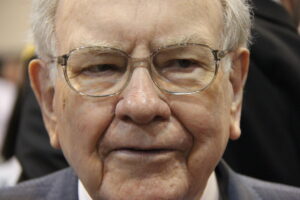Warren Buffett, the legendary investor and CEO of Berkshire Hathaway, is known for his love of dividend stocks. In fact, Berkshire Hathaway’s massive stock portfolio includes many dividend-paying companies that generate substantial income for the conglomerate. For instance, Berkshire’s investment in Coca-Cola alone earns the company $776 million annually from dividends.
But there’s one investment in Berkshire Hathaway’s portfolio that dwarfs all others in terms of generating income. This particular investment is so lucrative that it brings in a staggering $14 billion in annual income for the company. Yes, you read that right – $14 billion.
So, what exactly is this golden goose that’s bringing in such a significant amount of money for Berkshire Hathaway? It’s not another stock or a high-flying technology company. It’s actually Berkshire’s cash stockpile.
As of the most recent data available, Berkshire Hathaway held about $277 billion in cash and short-term investments. And while you might think that this giant pile of money is just sitting idle, earning nothing, that couldn’t be further from the truth.
A considerable portion of Berkshire’s cash holdings is invested in short-term Treasury bills, which currently offer an annualized yield of around 5%. This means that Berkshire is making nearly $14 billion per year just from its cash and short-term investments. That’s equivalent to approximately $1.15 billion every month or roughly $38 million every single day.
This substantial income stream from its cash hoard provides Berkshire Hathaway with unparalleled financial flexibility. With a cash reserve of $277 billion, Berkshire can weather economic downturns, make strategic investments, or even acquire entire companies if the right opportunity arises.
Despite the allure of having such a massive cash cushion, some investors have questioned why Buffett hasn’t deployed this money into more lucrative investments. The answer lies in Buffett’s disciplined approach to capital allocation. Business valuations remain high, and Buffett is hesitant to overpay for acquisitions, even with low-interest rates.
With his keen eye for value and a patient approach to investing, Warren Buffett is biding his time, waiting for the right opportunity to deploy Berkshire’s cash. In the meantime, the $14 billion in annual income from its cash stockpile continues to grow, providing Berkshire with a solid foundation for future investments.
But what happens when interest rates fall, as some investors anticipate? If the Federal Reserve lowers rates, Berkshire’s cash yield will likely decrease, eroding some of its $14 billion in annual income. While this may prompt Buffett to accelerate his investment strategy, for now, Berkshire Hathaway remains steadfast in its commitment to long-term value creation.
In conclusion, while the $14 billion annual income from its cash stockpile is impressive, Berkshire Hathaway’s true strength lies in its ability to adapt and thrive in changing market conditions. With Warren Buffett at the helm, Berkshire is well-positioned to navigate whatever challenges come its way and continue its legacy as a premier investment powerhouse.

